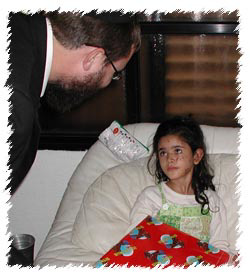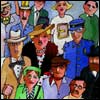July 19, 2006
As Chabad Rabbi Menachem Kutner came to the aid of three members of the Mor family of Safed who were being released from the hospital Sunday, just one question crossed his mind: Where would they go?
After all, the Katyusha rocket that left them and their mother injured also destroyed their house in Safed, and their father Tzion has been spending his days making the hour-and-a-half drive between Haifa's Rambam Hospital, where his wife is still hospitalized, and Ziv Hospital in Safed, where his other two children remained in serious condition on Monday.
Kutner made some phone calls, and discovered that the girls getting out of the hospital would be taken to their grandmother's house. He quickly made arrangements for diapers, baby formula, toys and other supplies to help make their grandmother's house child-friendly.
Unfortunately, quick action to provide help to victims of terror is Rabbi Kutner's specialty. As the head of the Chabad Youth Organization's Terror Victims Project in Israel, he has attended to the needs of many of the more than 8,000 victims of terror attacks over the last six years.
More than 900 people have been wounded since Hizbullah terrorists attacked Kutner says his office is a nerve center that can – and is – activated within minutes of an attack. In quieter times, the office oversees such programs as Big Brothers/Big Sisters, bar/bat mitzvah "twinning” for Israeli and Diaspora children, organizes getaway weekends for families of victims, and provides funding for life-cycle celebrations, such as bar mitzvahs and weddings for terror victims and families of victims.
Over the last week he has been in constant contact with almost all of the 230 Chabad shluchim around the country, to support and back up their efforts in cities, towns and kibbutzim across the North of Israel.
The Mors weren't the only family Chabad has worked to help in recent days. With eight fatalities and dozens of injured in Haifa from a Hizbullah missile that hit an Israel Railways train depot on Sunday, and attacks across Israel's North, more than 900 people have been wounded since Hizbullah terrorists attacked an IDF patrol along Israel's northern border a week ago Wednesday and began a missile assault on the country.
When Kutner and Rabbi Ariel Golan set out Sunday to visit the family of Shai Attias, they thought they would be offering support to the family of a soldier officially listed as missing in action since an Iranian-made missile hit his ship off the coast of Beirut over Shabbat.
Instead, as they drove up to the family house, workers were busy putting up a traditional mourning tent outside. An uncle of the 19-year-old missing sailor relayed the painful news that had just been delivered to the family: Shai's body had been recovered, and plans were being made for a funeral Monday.

"This is the hardest situation imaginable," Kutner explained. "This family has been in a state of uncertainty about their son for more than a day, then got the terrible news that he had really been killed. They want to do the right thing, but may not even know what the 'right thing’ is. Just knowing that someone else would make sure they had siddurim (prayer books), a low chair, and the other things they need is a huge headache they don't have to think about."
Kutner says victims of terror attacks are in the news for a day, then disappear, because things happen so quickly in Israel.
“But that's hardly the end of the journey for them," he said. "Take the Mor family: The girls have been released from hospital, but their mother hasn't been. Neither have their two older siblings (six-year-old Michal and five-year-old Natan), who suffered head wounds in the attack. It's our job to be there for the rest of the journey, as long as that takes."
Victims of terror attacks are in the news for a day, then disappear, Chabad is still there for them Yedida Mor, the girls' grandmother, appreciated the help.
"I've been a grandmother for many years," she said. "It's been a long time since I had little ones around the house, but here I am having to function as a young mother all over again."
Kutner has taken special care to support Chabad emissaries working with another needy population – Russian immigrants.
"In the Russian community," he said, "gathering together as a community in times of grief wasn't really part of their culture. So here you've got people left alone when tragedy has just struck. Our Russian-speaking shluchim offer material, spiritual and logistical assistance that in many cases can bring a bereaved family member 'back to life.' Sometimes a hug and a caring shoulder mean more than all the material help we are in a position to offer."
Before visiting the Attias family, Kutner and Rabbi Hanan Kochanowsky, Chabad's shaliach in the Ramat Eliyahu neighborhood of Rishon L'ziyon, made a shiva call to Ruti and David Yirmiyahu, whose son Shlomi was killed last week on the first day of fighting when his tank drove over a Hizbullah mine on the Israel-Lebanon border.

The connection was apparent as the shiva call progressed. In keeping with Jewish law, the rabbis sat quietly until the family started to talk. It took about a half-hour, but eventually the memories came.
"Remember, rabbi, when Shlomi came to give tzedakah before he was drafted?" said Ruti Yirmiyahu with a pained half-smile. "I told him to go, that tzedakah saves one from death."
David nodded in agreement, and added his own feelings.
The Chabad office is a nerve center that can – and is – activated within minutes of an attack "Every day people die in car accidents or in ridiculous fights. My son died as a soldier defending the Land of Israel and the Jewish people. I couldn't be any prouder of him," he said.
Rabbi Kochanowsky understood the remarks were an opening, and after allowing the bereaved parents to let out some more of their grief, he responded with words of comfort.
"What can I say about a young life cut short," he said. "But if we believe Hashem has a plan, and if we know that even terrible pain is part of His higher plan, part of His higher good, we can understand that Shlomi did not die in vain. Every person is born with a role to fulfill in this world, and Hashem decides when that mission has been fulfilled.
"Shlomi died in the service of the Jewish people. What greater mission could there be?"







Join the Discussion